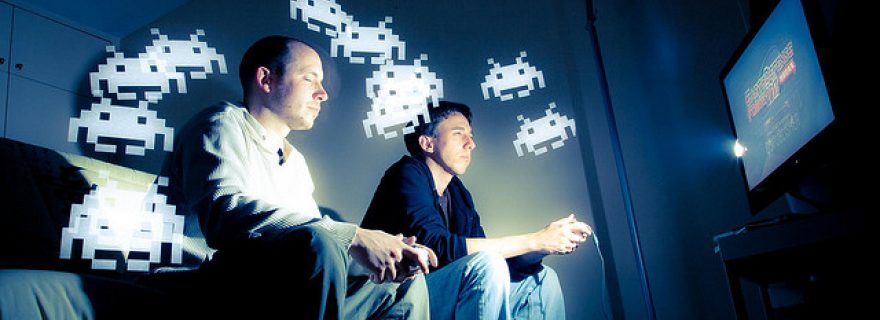The fountain of Youth: Videogames!
Our brain’s cognitive capacity deteriorates from the onset of 20 years of age. But no fear, this decline can be countered. The cure possibly lies within an unexpected field: videogames.
Multitasking challenges our control processes. Who hasn’t experienced this? A distracting early-morning phone call from your boss might have you end up with two different shoes on your feet for the rest of the day. To make matters even worse, our ability to multitask apparently declines with age. But, do not fret because there is a way to reverse this decline. By playing a video game named NeuroRacer the multitasking abilities of older adults (ages 60-85) levelled beyond those of untrained 20-year-olds. This provides us with a possibility to go back to our younger-selves’ abilities. So, let’s find out how to regain the youth of our brain.
Firstly, let’s explore this brain-age-rewinding game: NeuroRacer. Specifically its multitasking setting. The tasks seems simple: participants had to respond to a green sign – and only to the green sign - as rapidly as possible while simultaneously maintaining a car in the centre of a winding road using a joystick. Sounds simple enough, but during this test it was found that performance decreased significantly from 20 years onwards. This went on to the point that the younger participants had approximately 30% multitasking costs versus a shattering 65% multitasking cost in the older group.
So, the older participants were set to duty and had to train with NeuroRacer to overcome this devastating defeat. It was twelve hours of hard training spread over a month and it paid off: the older participants performed even better than their juniors had previously done with just a 10% multitasking cost compared to the earlier 30% of the younger participants. Even after six months without training the older participants still beat the untrained tweenies with just a 20% multitasking cost. A great victory for our older participants!
Can the youngsters make a comeback from this defeat? Yes, they can. But they must be willing to “play” their part. It is not just NeuroRacer that has enhanced cognitive functions in recent years. Apparently your off-the-shelf shooter-games like Unreal Tournament have already been doing this for frequent gamers over the past decade.
This might come as a surprise since games are more often criticized than praised. But apparently playing videogames (in this case shooter videogames) can provide several benefits for its players. These benefits range from low-level perceptual skill up through high level cognitive flexibility. Some of the perks are: improvement in visual sensitivity, perceptual decision making, speed of processing, the ability to select important aspects from the surroundings in space and time and, to come back to our previous statements, the ability to perform multiple tasks concurrently.
All these improved abilities are silently integrated into our everyday life; easing the processes in daily choices and creating the opportunities to make better decisions. So, can the youngsters make a comeback? The answer to this question doesn’t have to be no, if only we would embrace videogames, accept that they do not just provide entertainment and… play more of them.
But now let’s cast down the differences between the youngsters and the old-folk, and take to a more serious note. The improvement of cognitive deficits in older people by just twelve hours of training is most joyous news. Since there’s strong evidence for the rapid decline in cognitive functions in the older people, this new-found information provides optimism for the future of battling this. But the outcome provides an opportunity to reach even further.
Videogames like NeuroRacer could namely be implemented in an even wider array. The lasting multitasking cost reduction offers optimism for the use of such videogames as a therapeutic tool for other groups that suffer from cognitive control deficits. For instance, games could be developed to battle the consequences of ADHD, depression and dementia, all of which are conditions resulting from irregularities in cognitive control.
All in all, we should change our attitude towards videogames and stop underestimating their value. Our brain capacity declines with age and could therefore use a boost, one provided by games nonetheless. We can maintain our brain functions like those in our younger years if we but drink from the fountain of youth provided by videogames.
References
Anguera, J. A., J. Boccanfuso, J. L. Rintoul, O. Al-Hashimi, F. Faraji, J. Janowich, E. Kong, et al. (2013). ‘Video Game Training Enhances Cognitive Control in Older Adults’ . Nature, 501, 97–101. doi:10.1038/nature12486.
Green, C. S. & Bavelier, D. (2015). ‘Action Video Game Training for Cognitive Enhancement’ . Current Opinion in Behavioral Sciences, Cognitive enhancement, 4, 103–8. doi:10.1016/j.cobeha.2015.04.012.


0 Comments